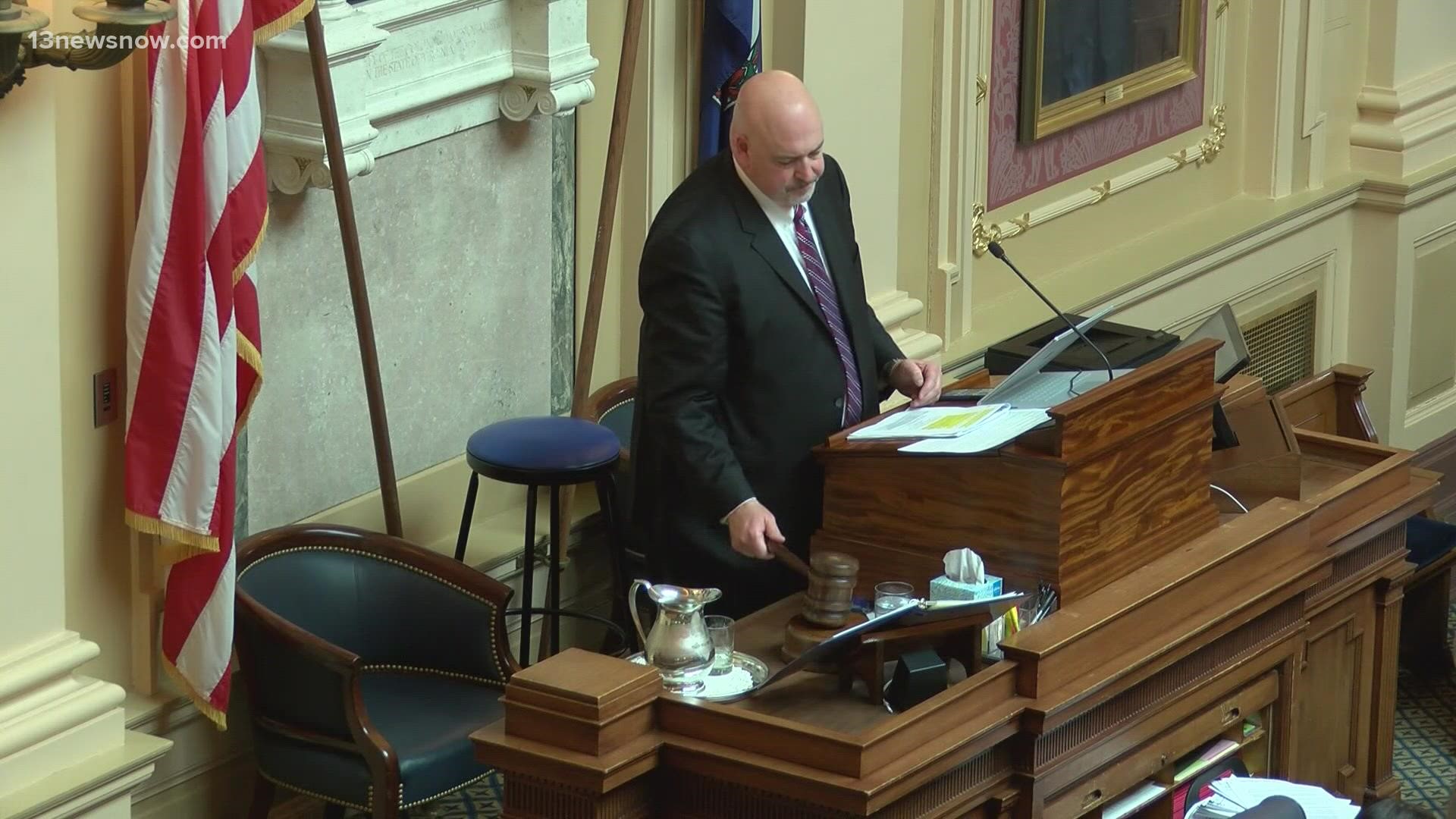RICHMOND, Va. — The divided Virginia General Assembly slogged through scores of Gov. Glenn Youngkin's proposed amendments to legislation and effectively upheld all of his vetoes Wednesday.
Lawmakers met for this year's one-day "reconvened" session, which also featured a dose of political drama as House Democrats voted for a leadership shakeup months after an unsuccessful election cycle that saw their party lose full control of the state government.
Democrats still narrowly control the state Senate, where lawmakers challenged many of the Republican governor's 26 vetoes but failed to secure the two-thirds vote needed to override any of them. The GOP-controlled House upheld each veto, despite the fact that many of the measures had initially passed with broad, or in some cases unanimous, support.
Of the 841 measures the General Assembly sent Youngkin during the regular session that ended in mid-March, the governor amended over 100, with proposed changes ranging from highly technical to highly contested.
The Senate spent much of the afternoon taking up and then setting aside a complicated amendment to a measure aimed at reining in the sales of products containing delta-8, a psychoactive form of THC.
Sales of items containing delta-8 have proliferated in Virginia and around the country, even though in Virginia there's currently no recreational retail market for marijuana. Youngkin's amendments would have prohibited the retail sale of products containing synthetic delta-8 as of Oct. 1, according to this office. They also would have created create two new intermediate misdemeanor penalties for possession of marijuana.
The chamber initially voted to reject the governor's amendments, which would have sent the measure as it passed back to Youngkin, who could have either signed it or vetoed it. GOP Lt. Gov. Winsome Earle-Sears, who presides over the chamber, broke a tied vote to reject the governor's amendments.
But then — after a series of private conversations — the chamber decided to reconsider that vote and send the measure back to a committee, a move that effectively kills it for the year.
Supporters said the issue was a matter of urgency, because hospitals and poison control centers have reported an uptick in people of all ages being sickened by products, including edibles, containing delta-8. But the attempts to restrict the product in were met with pushback from the hemp industry, which broadly argued the changes could impact the sale of CBD products that don't produce a high.
Senate members at times Wednesday seemed angry or confused about what procedural options were before them.
The measure's sponsor, Republican Emmett Hanger, told reporters the issue had been a difficult one because of the power of the hemp lobby.
"Some of them are making a ton of money off these products. Some of it's very legitimate and we want to encourage that. Some of it is just ... it's just a very lucrative business," he said.
The death of the bill comes after lawmakers failed earlier this year to agree on a measure that would have moved up the date for retail sales of marijuana to begin in Virginia following the legislature's decision last year to legalize adult possession of up to one ounce.
Lawmakers also had a particularly sharp debate on Youngkin's amendments to a measure that took aim at Loudoun County Public Schools, a suburban Washington district that has drawn outsized attention for controversies over curriculum debates, COVID-19 policies and the district's handling of two sexual assaults.
The governor's proposed amendments, which the Senate rejected, would have forced the entire nine-member board to face election this fall.
Democratic Del. David Reid, who sponsored the bill that originally dealt with how terms would be staggered, said requiring the board to hold new elections would set a dangerous precedent. "This could create complete chaos after every election, so be very careful about the precedent that we're making here," Reid said.
Republican Del. Christopher Head said the school board has "broken faith with parents," and holding elections this fall "simply brings accountability a few months early."
The measure now goes back to Youngkin for consideration as it passed.
Not all votes on amendments were partisan. Some were noncontroversial and sailed through with bipartisan support. And in some cases Republicans joined with Democrats in rejecting Youngkin's proposals.
Lawmakers also kicked off a special session earlier this month focused on ending a budget stalemate. Instead of opting to extend their regular session as the deadline approached in mid-March, the assembly decided to carry the matter over, along with dozens of other unfinished bills.
Budget negotiators have held sporadic talks since then but still don't have a deal to consider.
Only one special session matter was taken up Wednesday. On a bipartisan vote, a Senate committee defeated legislation the governor requested that would roll back the gas tax, then gradually restore it after a three-month holiday. A House version of the measure is still alive but would almost certainly meet the same fate once sent to the Senate.
In brief remarks to reporters, Youngkin said he was disappointed.
"It's Virginians' money, not government's money. ... I'm really disappointed that the Democrats don't see that," he said.
There was action outside the Capitol on Wednesday, too, as a crowd of hundreds gathered for the 4th annual Virginia March for Life. Earle-Sears was among the speakers, and Youngkin attended and joined the march.

